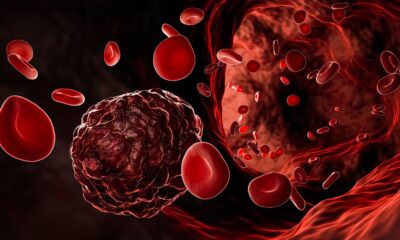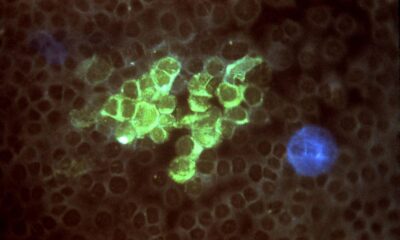Health
Alcohol is the cause of six types of cancer in the US, research shows

aAlcohol has long been classified as a carcinogen, but a study Thursday provides a clearer picture of how many cancer cases and deaths may be caused by alcohol consumption.
Researchers from the American Cancer Society and the International Agency for Research on Cancer estimate that 40% of all cancer cases in the United States in people aged 30 and older were due to “potentially modifiable risk factors,” including cigarette smoking, physical inactivity and the consumption of processed meat. , viruses, obesity, alcohol consumption and more. The data is dated to 2019 to avoid the influence of the pandemic, when cancer diagnoses fell due to delayed care. The results were published in the Journal of the American Cancer Society, CA: A Cancer Journal for Clinicians.
Cigarettes have long been a cause of cancer and have remained the number one cause with approximately 19% of cancer cases being due to smoking. Obesity was considered a cause in approximately 7.6% of cases, including malignancies of the gallbladder, esophagus, liver and kidneys.
Alcohol came in third, with 5% of cases in men and women over 30 years old being due to alcohol use – perhaps a surprising result for the public given the low awareness of the link between alcohol use and cancer. In a national survey among adults in the US in 2020, less than a third of respondents knew that alcohol increases the risk of cancer. About 10% said they thought drinking wine reduced their risk of developing cancer.
In total, according to the researchers’ calculations, about 24,000 cancer deaths and 95,000 cases in one year were attributable to alcohol consumption.
In the study, alcohol was linked to seven cancers: oral cavity, pharynx, larynx, colorectum and female breast, as well as squamous cell carcinoma in the esophagus and hepatocellular carcinoma in the liver. In addition, “there is increasing evidence” that alcohol can cause other cancers, such as pancreatic cancer, says lead author Farhad Islami. senior scientific director of cancer disparity research at ACS (which funded the study).
“The increased risk is due to the alcohol in alcoholic drinks, not the type of drink,” he said. A standard alcoholic drink in the United States contains approximately 14 grams of pure ethanol. That seems like it a 12 ounce serving of 5% ABV beer, a 5 ounce serving of 12% ABV wine, 8-10 ounces of 7% ABV hard seltzer, or 1.5 ounces of 40% ABV liquor. Research suggests the higher a person’s consumption, the greater the risk of cancer.
However, drinking even relatively small amounts can carry certain risks. A recent study Researchers at the Centers for Disease Control and Prevention found that about 17% of cancer deaths were due to low alcohol consumption – less than the national dietary guidelines recommended a maximum of two drinks per day for men and one drink per day for women.
Other research, including from Canada and up to a decade ago in the US, has also attributed tens of thousands of cancer cases to alcohol. And a rising tide of illnesses and deaths related to drinking, especially among women and young people, has alarmed experts. Cancer is an important part of this care, even though the death rate from cancer has been declining for years.
According to a growing body of research, breast cancer has strong links to drinking. Islami’s research found that breast cancer in women was the type of cancer where the majority of cases were linked to alcohol – with around 44,000, or 16% of cases, linked to alcohol consumption in 2019 alone. Another 18,000 cases, or 13%, of colorectal cancers in men and women combined were also linked to drinking. The proportion of cancer cases by type that could be attributed to alcohol tended to be higher in men than in women. In liver cancer, the proportion of men in alcohol-related cases was three times higher than that of women (23% versus 8%).
The notable exception to that rule was esophageal cancer, where 24% of cases in women were due to alcohol, compared to 17% of cases in men.
The data shows that about half of all mouth and throat cancers in men, or about 17,000 cases, were due to alcohol. In women, a quarter of cases of oral cavity, esophageal and throat cancer were due to alcohol consumption.
Deaths from oral cavity and pharyngeal cancer were the types with the highest proportion due to alcohol consumption, 40% and 38% respectively. More than a quarter of laryngeal cancer deaths were due to alcohol consumption.
Although research shows that drinking is associated with a lower risk of certain cancers, including kidney, non-Hodgkin’s lymphoma and thyroid cancer, this may be outweighed by the potential harm. Alcohol has been linked to disease virtually every organ system.
Research has shown that lowering drinking levels can also lower the risk of related cancers. If every person in the U.S. who drinks followed dietary guidelines, “approximately 80% of all alcohol-related cancer deaths could be prevented,” Islami said, pointing to the CDC data.
STAT’s coverage of chronic health conditions is supported by a grant from Bloomberg Philanthropies. Us financial supporters are not involved in decisions about our journalism.













